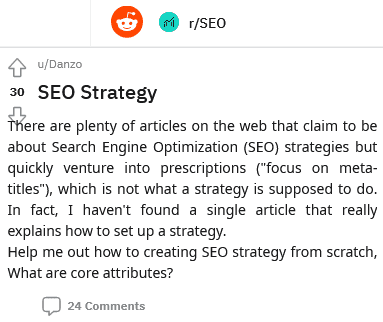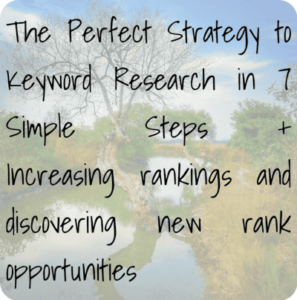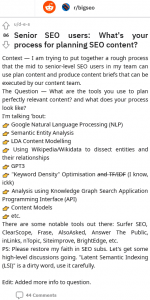u/Danzo
SEO Strategy
There are plenty of articles on the web that claim to be about Search Engine Optimization (SEO) strategies but quickly venture into prescriptions ("focus on meta-titles"), which is not what a strategy is supposed to do. In fact, I haven't found a single article that really explains how to set up a strategy.
Help me out how to creating SEO strategy from scratch, What are core attributes?
24 💬🗨
📰👈
Here's how you'd go about defining your SEO strategy:
• do comprehensive keyword research. Extract keyword difficulty from Ahrefs . Decide in what order to tackle the keywords. Do you do low>high difficulty, or low>high split by cluster?
• extract word count for the top ranking article for each keywords. Estimate how much word count you need to write to cover your niche. This'll help you figure out how much content ouput you wanna do. E..g. if it takes 120k words to cover your niche, you can do in a year at 10k words / month, or 6 months with twice that.
• figure our a unique spin/format for your content. How can you make it visually better than your competitors?
• define 5-10 link-building experiments you want to try. E.g. "outreach with an offer to send a free product for link." Execute each experiment, find why works, scale it up.
• comprehensively go through your competitor websites. Borrow ideas in terms of keywords, UX, whatever
• extract your competitor backlinks and figure out how to reverse engineer them
• clean up your competitor backlinks list (aka remove all spammy, scraper links). This way, you'll see how many "real" links they have and how long it'll take you to reverse engineer their profile
Where could I learn more about reverse engineering backlinks?
Just look up "'competitive backlink audit," there should be a lot of content on the topic. The gist is:
• extract all links that your competitors have for all pages on a Google sheet. delete slam links, Domain Authority (DA) 1 links, scraper links, etc.
• BAM, you have a complete list of all the links your competitors have.
• for each link, identity type. Why did they link to the competitor? Is it a niche edit? Guest post? Feature? Sponsored link/post?
• extract emails of the prospects via snov or hunter
• reach out and ask for a link. Make sure to have some kind of offer, not just "hey mate pls link to me"
• it's <year> – everyone knows how backlinks are beneficial. Small blogs will ask for $ for a link, medium-sized blogs will want something else in return (e.g. link swap, 3–way swap, etc.), Big blogs won't care u less you can give them something that's VERY value
MarketingRealityUK
This isn't strategy.
Thanks for adding to the discussion ;)
TheUltraZeke
A lot of that is because people conflate "strategy" with "tactics", though there CAN be some overlap.
Strategy:
a plan of action or policy designed to achieve a major or overall aim.
What happens in these articles ( often written by extremely knowledgeable SEO users) is that they are trying to explain some advanced concepts or strategies, and break it down into the actions taken in the various stages of a strategy in order to keep the article easier to read and organize. This helps convey the info a bit easier to new, or less experienced SEO users.
SO in the end they may omit some strategy stages in order to help convey the work needed to be done to achieve the goal of a strategy. This is where explaining strategy suffers though. Each site, even in the same vertical or industry as another, usually has slightly different goals and capabilities in achieving their goals, which must be taken into account when planning.
For instance dev resources on one site may be lacking compared to another, and so what another site with more dev resources can realistically do technically may be beyond the site you're working on. In cases like that strategy may shift to emphasize more content oriented items and fine tuning their process and content.
This is just a high level answer though.
📰👈
ecommerceoptimizer
Some decent responses here
You can create the best content in the world and it can be optimized perfectly plus better than everything else available on the planet but if no one cares or wants to know, it will end up like the majority of content published every single day… unseen!
You need to be 100% sure that they content you are producing is being searched for and that your tone matches their intent
This is <year>, not <year>. While keywords are important, focusing on them as we have in the past means your ranking will suffer drastically.
Amazed that no one has mentioned the importance of the knowledge graph, entities and topical relevance. If you do not make this an important part of your strategy, your other efforts may be a waste of time. If you were writing an article about python and did keyword research as suggested you would end up with a list of phrases with search volume to focus on like python programming, python coding, python function etc… the typical path is to use those phrases over and over in your content to establish density etc….
The majority of keyword methods explained on the net still preach this but are outdated. This method is no longer as effective for establishing great content. Google expects more, a lot more and they are not phrases keyword research would reveal.
Google expects the content to be more natural, hence the knowledge graph. The knowledge graph connects related phrases and helps Google distinguish between python coding, python the snake or Monty python. Google looks at the content before and after the phrases for clues. Google expects certain entities(definable words) related to a topic to be present.
Using the python example, Google would expect the phrases command prompt, syntax, function, string, list, sim, statement, object orientated, object, parameters, programming language, data structures, etc… none of those come up in a keyword search for python. When you use these phrases in your content and schema correctly, Google should be able to tell the article is about python without using the word python.
If you are creating any type of content on your site and skip this as part of your strategy, you are selling yourself short. Topicalrelevance.com is a great tool to help with this.
Something else that you shouldn't overlook from your strategy is web passages. Google used to focus on ranking web pages. It has expanded that to web passages which might be a specific section of content on a page. Many times the default meta title and meta description are not specific the the query and passage. Google will create its own title and description that it feels is appropriate for the query. They do not do the best job and have even been known to use the anchor text from a backlinks on a site that points to the content as the title. That sucks because our goal is to control the messaging and conversation. We make sure that each subheading can serve as an adequate Search Engine Result Page (SERP) title if Google chooses to us the text that follows. That means no more one or two word subheadings. Our results from doing this have been very positive.
These are some major things that should be a part of your overall strategy. I've been in this game since 1999 and we have specific methods that we follow to ensure that our content is being presented in a basic SEO format as it is written and laid out. It is much easier to go back later and tweak it as opposed to have to start from scratch after it is published which is the typical method for most businesses.
I used to have a large agency and we offered a done for you community building service that included launching with 50 to 100 evergreen articles, established social profiles along with an advocate-influencer strategy in place, automated traffic gen with specific email sequences to follow etc…
Now I only teach it but utilize all of the training modules with clients and their staff, outsourced writers etc…. You are smart for thinking big picture as I can say from experience that have systems, sop's, and a strategy in place saves a ton of time plus shortens the curve from publishing to content maturity where the site is organically driving a grip of traffic.
I'm not at all trying to sell you anything, I am plenty busy, but if you have any questions, hit me up.
Koloradoh
Content is the most essential element of Search Engine Optimization (SEO). None of the other things matter if you don't have web pages with content. A page without "SEO" can still rank, but it's impossible for any of the other stuff to matter without content. Put words on pages. Get a content strategy.
Keyword research is next IMO. With good and thorough research, the other aspects of SEO become less difficult. If you aren't ranking, it's often a case of selecting different keywords. Get a keyword tool and use the strategies associated with it.
Test with Minimum Viable Products (MVP)s and Minimum Viable Sustainments (MVS)s – Minimal viable pages and sites. This means to create decent content using a variety of well-researched keywords as efficiently as possible. The goal is to have multiple domains and pages to see which are getting actual results before investing more time and effort. Make sure the pages are indexed, then check for rankings. Look for pages that Google is ranking in the top 50-60 or so. Put your future efforts into these pages. Your work until this point has been theory. You now know which keywords are actually ranking for without doing anything other than very basic SEO.
Use HTML pages for your MVPs. Don't install any Content Management System (cms) until you know a domain is getting results. This is just a waste of time and server space until people actually visit your sites. I prefer a template that uses W3CSS, as it's the fastest loading and easiest to learn. This also takes care of many of the tech issues. No pages will load faster than HTML W3CSS.
Plan on updating pages. You don't always need 3000 word articles. Publish an 800 word article knowing you'll add a few hundred more words in a month or two. An 800 word article updated to 1200 words will probably outperform the same 1200 word article published once and never updated.
You can also change the keywords on existing pages. A web pages isn't etched in stone.
The key is to have a strategy that tests for actual results using the least effort and resources possible. Then focus your SEO and resources on your assets that are actually getting results.
lilyjohnson
Creating an effective SEO strategy for the business is very important as it can help in improving website ranking and visibility in search engines. This in turn will result in an increase in website traffic and hence sales of your goods and services.
Some of the basic steps that we need to keep in mind while making an SEO strategy are as below:
• Find relevant keywords related to your business.
• Create fresh and relevant content around keywords.
• Use keywords in your website page URL, title tag, and meta description.
• Improve user experience.
• Create high-quality backlinks
One can also take advice or help from expert agencies like Geek Informatic & Technologies Private Limited.
📰👈
Technical SEO Checklist
Ideal Daily SEO Life Hour by Hour
AMA: Strategy in Doing Keyword Research, Doing Concatenate Some Articles Into One Larger








